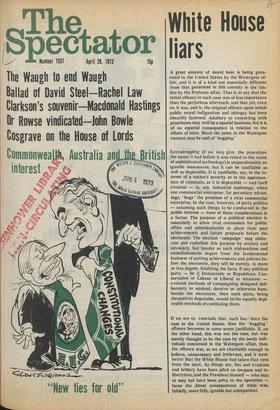White House liars
A great amount of moral heat is being generated in the United States by the Watergate affair, and it is of a kind not essentially different from that generated in this country in the 'sixties by the Profumo affair. That is to say that the initial offence in each case was of less importance than the perjurious aftermath, and that yet, even so, it was, and is, the original offence upon which public moral indignation and obloquy has been absurdly fastened. Adultery or consorting with prostitutes may well be a squalid business, but it is of no especial consequence in relation to the affairs of state. Much the same, in the Watergate context, may be said of bugging.'
Eavesdropping (if we may give the procedure the name it had before it was raised to the realm of sophisticated technology) is unquestionably an ignoble manoeuvre, but it can be justifiable as well as deplorable. It is justifiable, say, in the interest of a nation's security or in the apprehension of criminals, as it is deplorable — and itself criminal — in, say, industrial espionage, when one commercial enterprise, for pecuniary advantage, 'bugs' the premises of a rival commercial enterprise. In the case, however, of party politics — assuming such things to be conducted in the public interest — none of these considerations is a factor. The purpose of a political election is essentially to allow rival contenders for public office and administration to place their past achievements and future proposals before the electorate. The election 'campaign' may elaborate and embellish this purpose by oratory and advocacy, but insofar as such elaborations and embellishments depart from the fundamental business of putting achievements and policies be fore the electorate, they will be merely, to more or less degree, falsifying the facts. If any political party — be ik Democratic or Republican, Con servative or Labour or Liberal or whatever — evolved methods of campaigning designed deli berately to mislead, deceive or otherwise bam boozle the electorate, then such plans, being themselves deporable, would invite equally depl orable methods of combating them.
• If we are to conclude that such has' been the case in the United States, then the 'bugging' offence becomes in some sense justifiable. If, on the other hand, this was not the case, but was merely thought to be the case by the seedy individuals concerned in the Watergate affair, then the offence was, as we are charitable enough to believe, unnecessary and irrelevant, and it were better that the White House had taken that view from the start. As things are, lies and evasions and bribery have been piled on trespass and indiscretion, and the President himself — who may or may not have been privy to the operation — faces the direst consequences of what was, initially, mere folly, ignoble but unimportant.


































